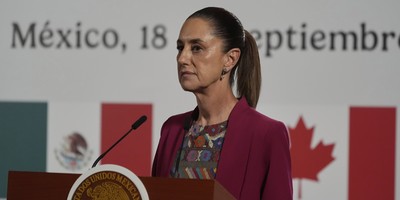On the day that President Donald Trump was inaugurated to his second term, Senate Minority Leader Chuck Schumer did two remarkable things. He spoke in favor of a proposition Trump had made -- and voted for it.
It was the nomination of Sen. Marco Rubio to be secretary of state.
“Sen. Rubio is an example of a qualified nominee we think should be confirmed quickly," Schumer said.
The Senate then voted 99-0 to confirm him.
At his confirmation hearing, Rubio had promoted a realistic approach to foreign policy -- based on the interests of the American people rather than some vision for transforming the entire world.
"Out of the triumphalism of the end of [the] long Cold War emerged a bipartisan consensus that we had reached 'the end of history.' That all the nations of earth would become members of the democratic Western led community," Rubio said in his written testimony. "That a foreign policy that served the national interest could now be replaced by one that served the 'liberal world order.' And that all mankind was now destined to abandon national identity, and we would become 'one human family' and 'citizens of the world.'
"That wasn't just a fantasy," said Rubio, "it was a dangerous delusion."
"As a nation founded on the revolutionary truth that 'all men are created equal' with rights that come not from man but from God, we will never be indifferent to the suffering of our fellow man," said Rubio.
"But ultimately, under President Trump, the top priority of the United States Department of State must be and will be the United States," he said.
"Every dollar we spend, every program we fund, and every policy we pursue," Rubio said, "must be justified with the answer to three simple questions: Does it make America safer? Does it make America stronger? Does it make America more prosperous?"
Recommended
The sort of foreign policy Rubio is not embracing was embraced by President George W. Bush -- who made it a focus of his second inaugural address.
"The best hope for peace in our world is the expansion of freedom in all the world," Bush said in that speech.
"So, it is the policy of the United States," Bush said, "to seek and support the growth of democratic movements and institutions in every nation and culture, with the ultimate goal of ending tyranny in our world."
This approach -- along with faulty intelligence about Iraq's weapons of mass destruction programs and ties to al Qaida -- helped inspire Bush to launch a congressionally authorized war in Iraq in March 2003.
"Intelligence gathered by this and other governments leaves no doubt that the Iraq regime continues to possess and conceal some of the most lethal weapons ever devised," Bush said in an address delivered March 17, 2003.
“And it has aided, trained, and harbored terrorists, including operatives of Al Qaida," he said.
Speaking to the Iraqi people, Bush said: "We will tear down the apparatus of terror, and we will help you to build a new Iraq that is prosperous and free."
"The day of your liberation is near," he said.
“And when the dictator has departed," Bush said of Iraq, "they can set an example to all the Middle East of a vital and peaceful and self-governing nation."
Three years later, the Senate Select Committee on Intelligence issued a report entitled: "Postwar Findings About Iraq's WMD Programs and Links to Terrorism and How They Compare With Prewar Assessments."
"Postwar findings do not support the 2002 National Intelligence Estimate (NIE) judgment that Iraq was reconstituting its nuclear weapons program," it concluded.
"Postwar findings," it said, "do not support the 2002 National Intelligence Estimate (NIE) assessment that 'Iraq has biological weapons' and that 'all key aspects of Iraq's offensive biological weapons (BW) program are larger and more advanced than before the Gulf War."
“Postwar findings," it concluded, "do not support the 2002 National Intelligence Estimate (NIE) assessments that Iraq 'has chemical weapons' or 'is expanding its chemical industry to support chemical weapons (CW) production."
"Postwar findings," it said, "indicate that Saddam Hussein was distrustful of al-Qaida and viewed Islamic extremists as a threat to his regime, refusing all requests from al-Qaida to provide material or operational support."
Today -- 22 years after the second Iraq war started -- is Iraq a free country?
The State Department's latest report on human rights in Iraq, covering 2023, describes a country where the government does not respect basic rights.
"Significant human rights issues," the report said, "included credible reports of: arbitrary or unlawful killings, including extrajudicial killings; enforced disappearance; torture and cruel, inhuman, and degrading treatment or punishment by government officials." They also included "serious restrictions on free expression and media," "substantial interference with the freedom of peaceful assembly" and "serious government corruption."
The day after he was confirmed, Secretary of State Rubio gave a speech to State Department employees. Americans had elected Trump, he said, with "a very clear mission" in foreign policy. "And that mission is to ensure that our foreign policy is centered on one thing and that is the advancement of our national interest, which they have clearly defined through his campaign as anything that makes us stronger or safer or more prosperous."
It is not to remake the world. It is to protect the liberty, prosperity and security of the American people.
























Join the conversation as a VIP Member